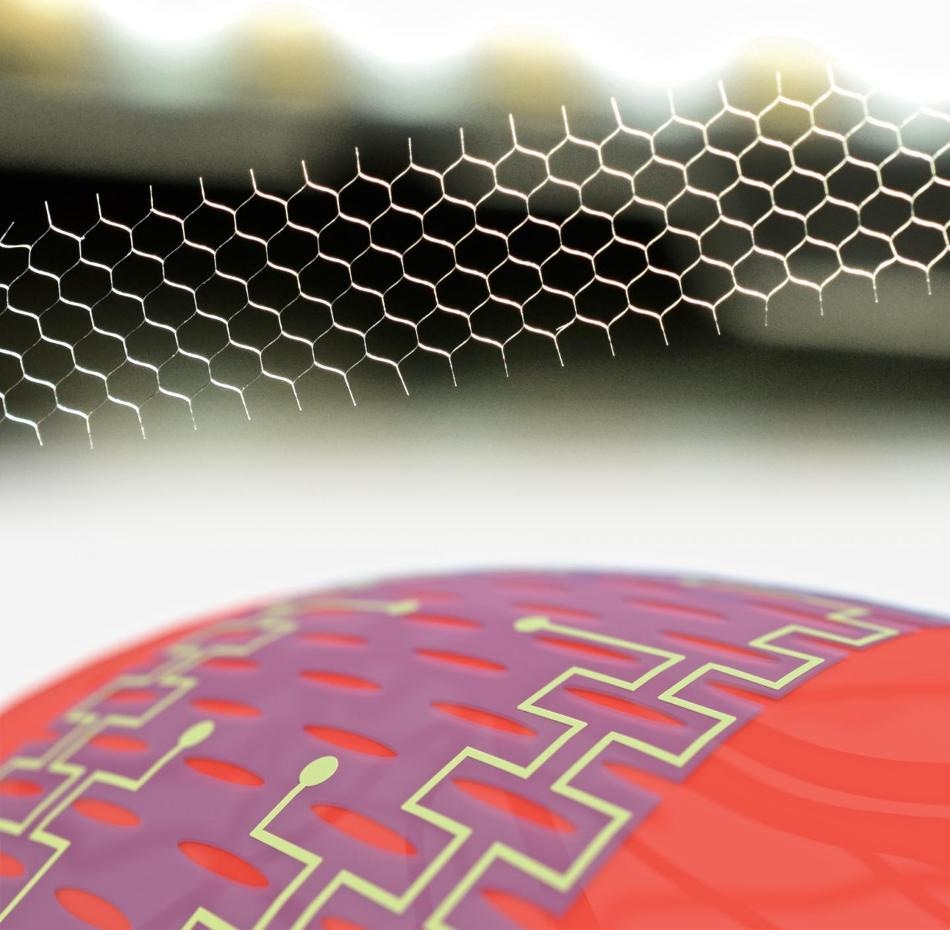Dec 11 2017
Researchers from the Department of Electrical and Electronic Information Engineering and the Electronics-Inspired Interdisciplinary Research Institute (EIIRIS) at Toyohashi University of Technology have created an ultra-stretchable bioprobe using Kirigami designs.
 This is an ultrastretchable 'Kirigami' bioprobe device. The stretched device (upper picture) and the device placed over the biological tissue (lower image). Credit: COPYRIGHT (C) TOYOHASHI UNIVERSITY OF TECHNOLOGY. ALL RIGHTS RESERVED.
This is an ultrastretchable 'Kirigami' bioprobe device. The stretched device (upper picture) and the device placed over the biological tissue (lower image). Credit: COPYRIGHT (C) TOYOHASHI UNIVERSITY OF TECHNOLOGY. ALL RIGHTS RESERVED.
The Kirigami-based bioprobe allows the user to follow the shape of spherical and large deformable biological samples such as brain and heart tissues. Furthermore, its low strain-force characteristic minimizes the force induced on organs, thus enabling minimally invasive biological signal recording. The results of their research have been published in the December 8th issue of Advanced Healthcare Materials.
High stretchability and deformability are potential properties to boost the applications of flexible film electronics including actuators, sensors and energy harvesters. Particularly, they have significant potential for applications related to 3D soft biological samples such as tissues and organs that display large and fast changes in their surface area and volume (for instance - a beating heart). However, conventional elastomer-based stretchable devices need a large strain-force to stretch it that arises from an intrinsic material feature.
This makes it difficult to follow the deformation of soft biological tissues, thus stopping natural deformation and growth. For device applications relating to soft biological samples, it is very vital to decrease the strain-force characteristic of the stretchable devices to attain low invasiveness and safe measurements.
A research team in the Department of Electrical and Electronic Information Engineering and the EIIRIS at Toyohashi University of Technology has created an ultra-stretchable bioprobe employing Kirigami designs.
To realize the ultra-stretchable bioprobe with low strain-force characteristic, we used a Kirigami design as the device pattern. The remarkable feature of Kirigami is that rigid and unstretchable materials can be rendered more stretchable compared to other elastomer-based stretchable materials. The stretching mechanism is based on an out-of-plane bending of the thin film rather than stretching of the material; therefore, the strain-stress characteristic is extremely low compared to that of elastomer-based stretchable devices.
Yusuke Morikawa, First Author of the article and Ph.D. candidate
The leader of the research team, Associate Professor Takeshi Kawano, said, "The idea germinated in my mind one morning when I woke up and saw my son playing with Origami and Kirigami. I saw him realize high stretchability of the paper while creating the Kirigami designs. This made me wonder whether it is possible to develop stretchable electronics using the concept of Kirigami. Surprisingly, our preliminary studies on Kirigami-based parylene films by microelectromechanical systems technology exhibited high stretchability of 1,100%. In addition, we are extremely excited that the fabricated Kirigami-based bioprobes possess the distinct advantages of high stretchability and deformability, and are capable of recording biological signals from the cortical surface and beating heart of a mouse."
The research team trusts that the Kirigami-based bioprobes can also be applied to probe tissues and organs that display time-dependent variations in their surface and volume because of growth or disease. This is expected to cause the ultimate realization of a totally new measurement technique that can be helpful in understanding the mechanisms controlling growth and diseases like Alzheimer's.